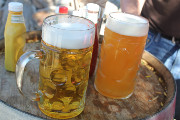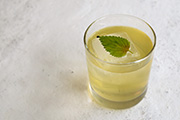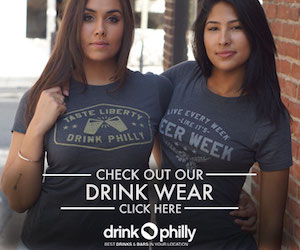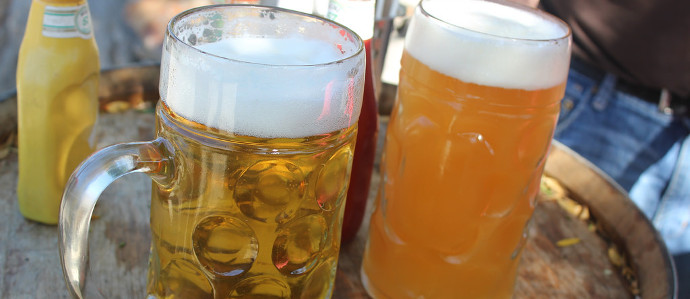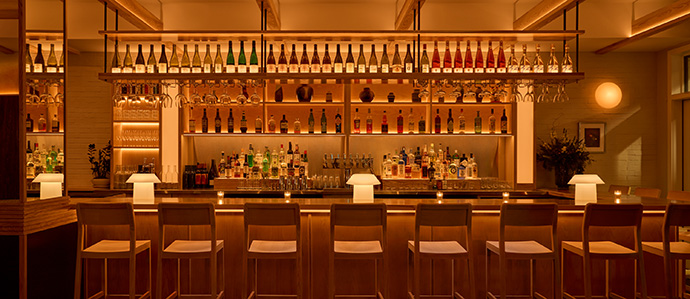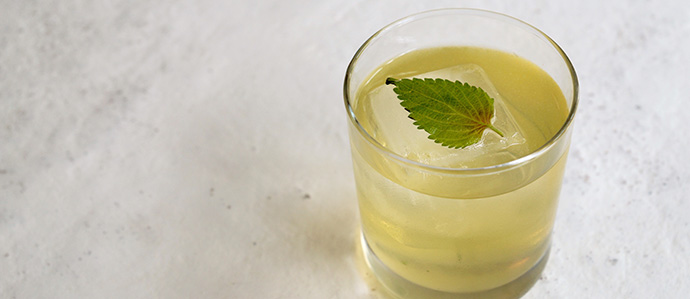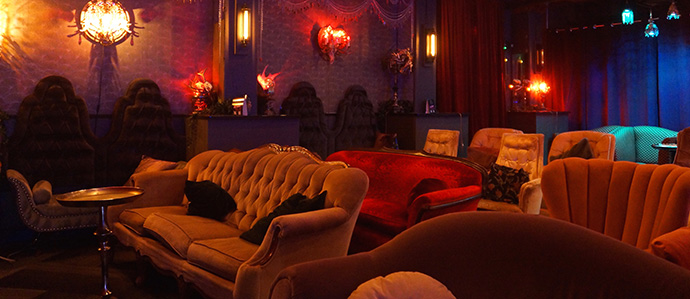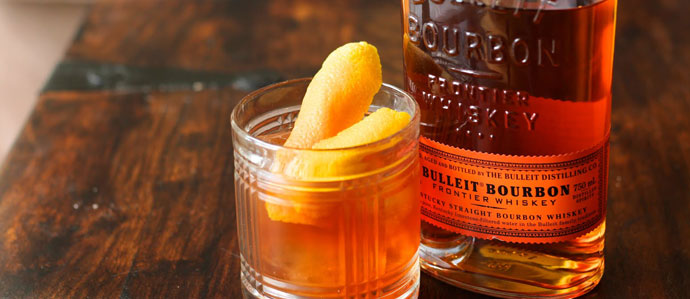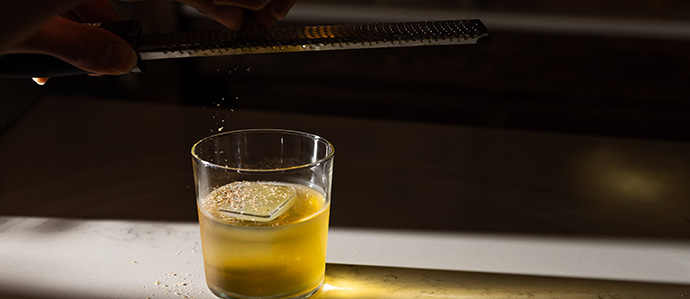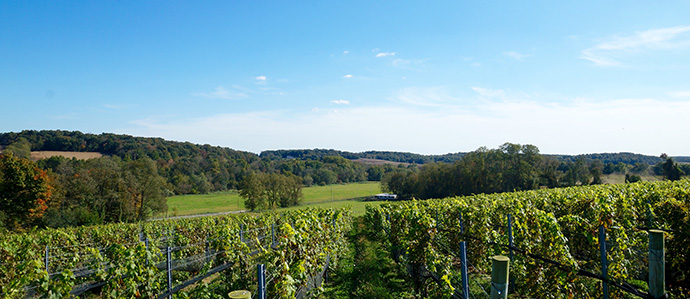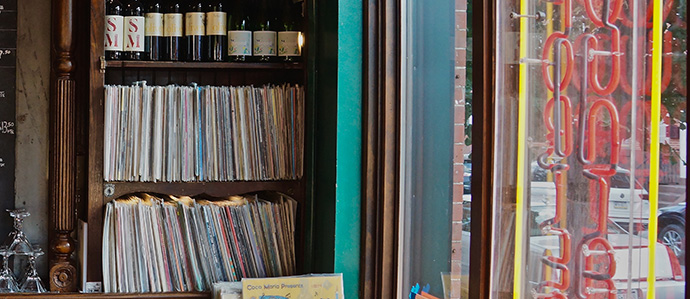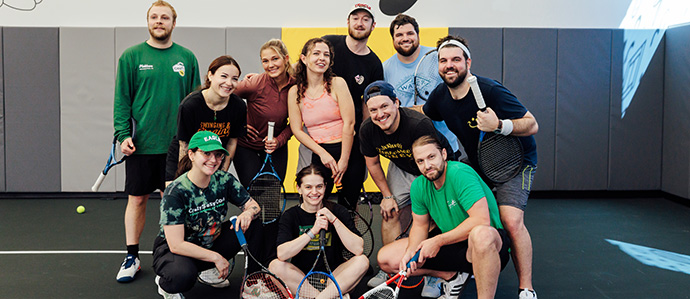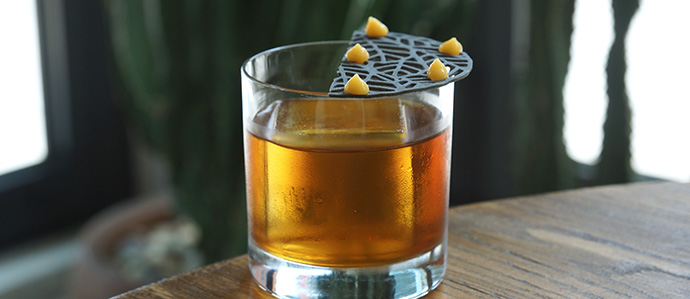Behind the Bar: Solomon Thomas - Ambassador, Bartender, & Industry Community Advocate
.jpg)
In this segment of Behind the Bar, we get a chance to speak with bartender and industry community advocate, Solomon Thomas. Solomon was born and raised in Newark NJ, and frequently visited Philadelphia to co-create a beer dinner series with his close college roommate, Jack Goldenberg, a former Philly chef who now runs Urban Roots Farm. Solomon's been in the hospitality industry for over 15 years and is now Bacardi's acting Portfolio Brand Ambassador in Philadelphia and works in co-collaborations to develop long-lasting relationships and build awareness through education, engagement, and events. For this interview, we decided to interview Solomon at his former bartending spot, The Trestle Inn.
Drink Philly (DP): Tell us a little bit about The Trestle Inn.
Solomon Thomas (ST): The Trestle Inn is a whiskey Go-Go bar that's been here for a long time. I think originally it was a predominantly black African American frequented strip club bar, before the 80s until it changed ownership. The current owners have been here since 2012 and have tried to maintain its allure, but make it more open to everyone. We're open Thursday, Friday, and Saturday 5 PM to 2 AM, and we feature vinyl music curated by DJs. They usually spin or play or do various playlists based on the vinyl’s that they have in their collection.
It's a small team here. We do our best to be consistent and stick to some classics. The menu is diverse but not too crazy, definitely without pretension. We want to make drinks that are enjoyable, but don't depart from the experience of enjoying yourself. You're able to grab your drink and still be able to boogie on the dance floor and not worry about some delicate thing that you have to savor.
.jpg)
DP: Have you bartended elsewhere?
ST: I opened and managed the bar at Destination Dogs, which unfortunately has closed from the pandemic. I was at Moriarty's for a brief period. I helped reopen the Blind Barber during the pandemic. I've worked at Philadelphia Distilling and I bartended at R&D.
DP: Can you talk about your advocacy work for the hospitality industry?
ST: I was a project manager at Lush Life, which is a media and events production company that advocates on the behalf of hospitality workers. I was responsible for managing and executing their projects. Lush Life is known for some pretty well-known industry programs that are open to everyone across our country and internationally. Camp Runamok being the most predominantly known one, Portland Cocktail Week as well. They also help out with Bartenders Weekend and various other programs.
I ran the Jump Shot program while I was there, which is a program sponsored by D'USSÉ Cognac and was a program aimed at getting bartenders to be active again. We had a former Harlem Globe Trotters player come in and teach bartenders and industry professionals how to play basketball for a few weeks. We did that in New York and Chicago. The training period was followed by a happy hour, sponsored by D'usse' Cognac at a local bar with featured cocktails and it was a chance to build some camaraderie. All over the city we brought bartenders together to make friends outside of their own neighborhood and bond over some basketball and good drinks.
DP: What's trendy right now?
ST: I mean, trends in general are one of those things that are simultaneously kind of horrendous and also wonderful. With social media being so important to business and commerce in general these days, what can be trendy can just be at the whim of a popular influencer. If one person who has enough pull online says this thing is trendy, they command the space. We've seen trends that from an industry side, we don't think really have much merit. But the person who first introduced the trend didn't necessarily consult a professional as to why it might be trendy or why it should be a trend. It can just be a trend for any whim. So we have to adhere to that. And I think good businesses won’t ignore that out of any sort of pride, but will pay attention to how to make it actually make sense.
I think one of the things that comes to mind as a trend that popped up was that whole Parmesan cheese, Espresso Martini. I don't know who started this trend, but the idea of putting Parmesan cheese itself, like freshly grated Parmesan cheese, into the Espresso Martini doesn't really make sense for me from a textural standpoint. Aromatically I can understand it. I can also understand wanting to put Umami in a cocktail, which is what parmesan cheese represents, but there are better ways to infuse that flavor into the spirit as opposed to letting this cheese sit on the drink, dirty a glass, sink to the bottom, and be inconsistent.
Basically, that's where I wish people who are interested in being a part of trends, who don't have any experience in our industry, would talk to someone at least first about it. Does this make sense as a trend before claiming it is something? I'm happy to see the resurgence of certain cocktails up and down. I just wish that there was a little more consistent training.
.jpg)
DP: What are some trends you wish would die?
ST: When bartenders pour a martini from a high height and try to spray the stream with citrus as it goes down. I've done it for photos because it looks cool but I don't think it really makes a lot of sense. I mean, the odds of you getting that stream with the oil are slim. Also what you're doing is aerating the drink by agitating the pour from too high of a height. If you wanted to aerate the cocktail, you should have shaken it.
If you're stirring this cocktail, you should strain it at a low height so that minimal air gets into the drink because you want the texture to come from the spirits, not from it being intermixed with oxygen or the air environment around us. So you're doubly missing the spirit and over infusing the drink. I think it's a total gimmick and not really a practical application of citrus to scent a cocktail. So that one I don't love, but it looks super cool.
DP: Any predictions about where the industry might go next?
ST: We're starting to get to a place where young bartenders, or new to hospitality people, who came into our industry post-pandemic are starting to feel a little more confident about their ability to tend the bar, to step up from bar backing and serving to actually mixing and serving cocktails for guests. I'm hoping that comes with the appropriate resources to help educate them about what's happening.
I think what you might see is more of the elder bartenders or hospitality professionals starting businesses that aim at education and sharing proper techniques in a format that's similar to what you see with people posting recipes for culinary dishes. I think you'll see more resources from bartenders trying to convey what they know, which I think is a good thing. I see more mentorship like that.
DP: One unexpected fact about you?
ST: I went to boarding school with Mark Zuckerberg.
.jpg)
DP: Favorite beer?
ST: My favorite beer in general is a light beer. I gravitate towards the champagne of beer, High Life. I worked in beer more significantly when I was at Destination Dogs and would drink more nuanced, flavorful, crafted beers, but the way I drink these days is more light beers. And I like spirits more.
DP: Favorite liquor?
ST: I will drink on ice or neat, a shot of really lovely agave spirit - Tequila, Mezcal, or Sotol based - or I'll drink something sugar cane based - a rum spirit like a Haitian rum, or a lovely Puerto Rican rum or something like that.
DP: Favorite cocktail?
ST: My favorite cocktail is always the one that's in my hand, and I don't really have one that I gravitate towards. For me, it's definitely a mood-based thing. I rarely drink cocktails when I go out to bars these days because I've had enough of them at this point.
DP: Yeah. What's your favorite kind of customer?
ST: My favorite kind of customer is the customer that comes in ready to be disappointed but is turned around by the experience. I think we don't get many chances to have ourselves checked in a positive way and that is one of those scenarios. People sometimes come in with their entire life history behind them, right? And sometimes it's just that day that puts you in a foul mood but some folks come in ready to not be happy. If I can turn that person around, that's what makes my day. That's the best. I would love the customer to get to a place where they start to trust me based on the experience they've had, open up the vulnerability a bit. And that happens more with people who come in underwhelmed and have the bar raised way above their expectations.
.jpg)
DP: What do you think are the essentials for a good home bar?
ST: A good home bar should have your personal favorite spirits. If you are a rum or tequila or gin or vodka or whiskey person, you should explore that first. And then you should explore the cocktails that you love that have those base spirits, and look at the modifiers that are accessible and approach those. I don't think there's a general home bar you need to have. If you're entertaining for other people, then yeah, it makes sense to try and have all the base spirits. But most people in this day and age have a small circle of friends and probably have similar interests and similar tastes. So, I don't think you necessarily need to feel pressured to build a full bar in your house.
The one thing that a lot of cocktails can benefit from and balance them out is saline solution. Sometimes a little bit of salt goes a long way, not salt in the margarita sense where you're putting a whole swath in a rim, but instead a saline solution. When you add a couple of drops to a cocktail it often balances out the rough edges on the palate. It's designed so you shouldn't taste it, it just helps you balance the drink in a similar way that you don't taste just bay leaf in a soup. But every soup recipe calls for like one bay leaf, right? It's kind of the same.
DP: Where do you go for a drink when you're not working?
ST: I often go to R&D because I like drinking there, the staff is awesome. The drinks are innovative and fun for me and I can get my beer and a shot there. They're not a pretentious bar. I can still get a High Life and a shot of some rum there and enjoy myself. If I want to get a Daquiri I can get an expertly made one there, so I love going there. More so I am that person who goes to bars for the bartender who's there than the bar itself.
I love to visit Damian at Irwin's Upstairs. I like to visit my former co-bar manager Chris Zingler and his wife Alyssa and our friend Tony Jimenez who are all at 1 Tippling Place. I have friends at The Franklin. John Bamonte runs an excellent program at Vernick Fish, it's a beautiful bar as well. Alison Hangen and Patrick Jennings at Andra Hem are great. I haven't sat at Paul McDonald's bar in a while, but that's always an experience at Friday, Saturday, Sunday. Glory Bar & Kitchen in Old City is a great spot. Fishtown Tavern is my local because that's just a place I can get taken care of every time and place they know my name. It's my Cheers bar. I can get in and get out and get my drink and I get home within walking distance.
.jpg)
DP: What's the secret to being a great bartender?
ST: I think it stems from something my mother said to me a long time ago that's always stuck with me - "you have two ears and one mouth for a reason." It's about the ratio of how much you listen versus how much you speak. Making your guests feel heard and seen before you speak above them is important and it has a lot to do with the vulnerability when we come to a new scenario.
The guest sees you in some sort of role of expertise, right? They see you as knowing a bit more about what's behind you than what they know. Those that come in that who have a nine to five, as we call them a "daywalker job," come into a bar and they want the best possible experience. But they use words that have nothing to do with their personal preference because they haven't been taught the lingo. It's not something we're taught in schools.
Questions like, "what's good here?" or "what's the most popular drink?" or "what would you get?" - none of those questions have anything to do with their personal preference. "What's good here" by the way is kind of the most insulting question you can ask, not because it's an insulting way of asking a question, but the thing about that is we worked really hard on making lists of things that we think are really good. So, if you don't look at the menu at all you're ignoring all the effort that we put into highlighting things that we think are good, that we stand behind. It's a list, it's called the menu. That's what's good here. We wouldn't put something we think is bad on there. They probably didn't even think about that when they said it. Just take a second to read it. You might find something you like there. If you don't like any of that, then let's talk.
I don't need you to know everything that I know. I only need you to know about yourself, which I know nothing about, right? So you're the expert on you? I'm the expert on this. Let's come to a middle ground. We can find the right drink for you. The right drink for you now is not the right drink for you 20 minutes from now. So let's find out what works for you.
Because we had a little bit of dialogue, I know what drink fits the mood that you're in that will get you there, and a lot of that has to do with you, so it's a collaboration. We need to collaborate on this moment together to really find the right drink for you. So I want people to get into that with us. I promise it's painless, and at the end of it, you'll have a great drink and you'll enjoy yourself more.
.jpg)
DP: If you could have a drink with any famous person, living or dead, who would it be and what would you drink?
ST: I would probably have a drink with Harriet Tubman, and we would have a punch. It might be like a local punch. It'll be like a mixture of things, right? Like some juices, some syrups - it'll be like a tea based thing and some booze. And we would talk about getting people to put their faith in you, because that's a crazy thing to think about. We’d have punch. Punches are delicious, have zero pretension about them, and you don't need super fancy ingredients. What you need is people who care about it, who taste it, who often collaborate together to make it. It feels like community, and its best served to a group of people. I love them, and it's a drink I'd love to share with Harriet and whoever else is around.
.jpg)
Pink Panther Sour: Wild Turkey 101 Bourbon, Galliano, raspberry syrup, lemon, pink peppercorn, mint
Photos by Drink Philly.
Tags: Behind the Bar, Cocktails, Education






